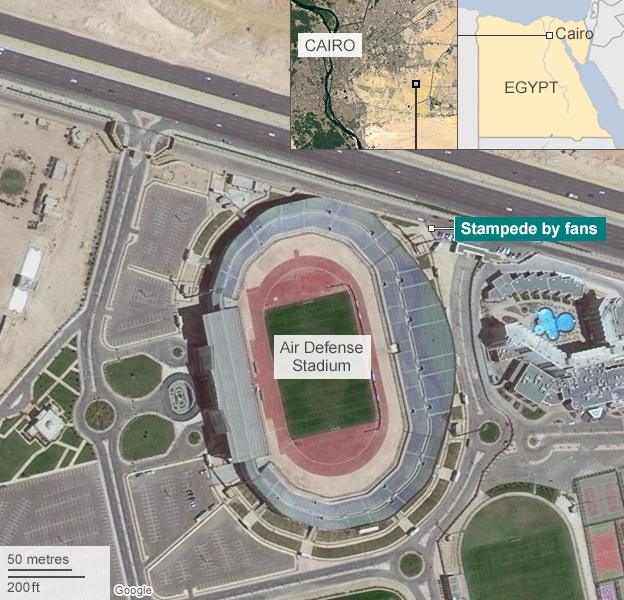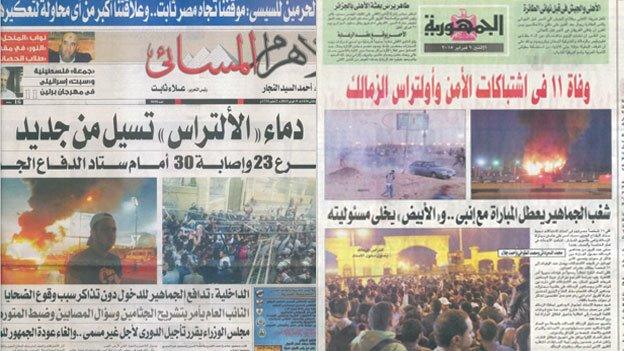Egypt suspends football league after Cairo stadium deaths
- Published
Footage shows chaos at the scene, as the BBC's Sally Nabil reports
The Egyptian authorities have suspended football league matches indefinitely after at least 22 fans were killed in clashes with police at a Cairo stadium.
People were crushed in a stampede after police fired tear gas at supporters of Zamalek who were trying to gain entry to a match against city rivals ENPPI.
The fans blamed police for forcing them through a narrow, fenced-in passageway.
President Abdul Fattah al-Sisi has expressed "great sorrow" over the deaths and promised an investigation.
The Egyptian Premier League was last suspended in February 2012 after 74 fans were killed in a riot at a match in Port Said.
The league resumed the following year, but supporters were banned from attending matches until last December. Since then, limited numbers have been allowed into stadiums.
'Martyrs'
State media reported that only 5,000 tickets were made available for sale to the public for Sunday evening's match between Zamalek and ENPPI at the 30,000-capacity Air Defense Stadium in the east of the capital.

Fans used fireworks to set vehicles on fire after the clashes

Earlier, there were arguments as people tried to enter the stadium
But thousands of ticketless Zamalek fans reportedly tried to gain entry anyway.
The interior ministry said they had "attempted to storm the stadium gates by force, which prompted police to prevent them from continuing the assault", setting off a deadly stampede.
"Because of the stampede, some choked and died from asphyxiation, while the rest died from being trampled," a police official told the state-run newspaper, al-Ahram.
But the Zamalek supporters' group, the White Knights, said the stampede began when police fired tear gas at a crowd being forced to pass through a fenced-in passageway about 3.7m (12ft) wide.
"[The] iron cage inside which most people died was installed a day before the match and it has never been used in any country of the world," a statement on Facebook said.

At the scene: Orla Guerin, BBC News
At the stadium piles of shoes left behind by the dead and wounded were a silent testament to a stampede. Zamalek fans claim the violence began when the authorities opened just one barbed wire gate to let them in.
Witnesses told us a fence had collapsed as the crowd surged forward. "Suddenly the security forces began firing tear gas and birdshot all over the place," one said.

Another young man told us through tears that up to 50 fans starting piling on top of each other. "We were carrying people away," he said "to save them getting trampled to death".
It is just three years since more than 70 Egyptian fans were killed in a riot at a stadium in Port Said. After that limits were placed on the numbers attending matches. Those restrictions were lifted just weeks ago.
There's a history of tension and animosity between the security forces and hardcore football fans - many of whom were involved in the 2011 revolution. There are fears of further clashes in the days ahead.

Officers later fired birdshot at the fleeing fans, the White Knights alleged, contradicting comments by the head of the emergency services, Khaled al-Khatib.
The White Knights described the dead as "martyrs" and accused the police of a "massacre and premeditated murder".

Zamalek fans allege they were only allowed in through one barbed wire gate

Police in action in Cairo on Sunday. There have been clashes at Egyptian football matches before, the worst in Port Said in 2012

It is thought many of those who died were crushed in a stampede

Restrictions on the numbers attending Egyptian games are to be reintroduced
However, the president of Zamalek, Mortada Mansour, said in an interview with a private TV station that police had not opened fire on the club's fans, and that the violence was "orchestrated" to undermine the upcoming parliamentary elections.
Mr Mansour is a staunch supporter of Mr Sisi, the former military chief who led the overthrow of Islamist President Mohammed Morsi in 2013.
The president's office issued a statement on Monday expressing his "great sorrow" and calling for the "revealing of the circumstances of the incident and those who are responsible for it".
The public prosecutor has already ordered the arrest of the leaders of the White Knights.
Despite the violence, which also left at least 20 people injured, the match went ahead and ended in a 1-1 draw.
Relations between security forces and hard-core Egyptian football fans known as "Ultras" have been strained since the 2011 uprising against President Hosni Mubarak, in which the Ultras played an important role.
Many people accused the police of deliberately failing to intervene in the riot in Port Said the following year in revenge. Two officers were subsequently sentenced to 15 years in prison for gross negligence, but the acquittal of seven others sparked widespread anger.
- Published9 February 2015

- Published9 February 2015

- Published9 March 2013
